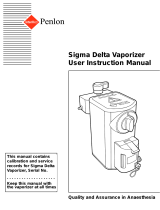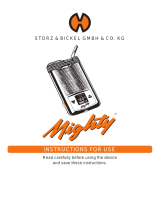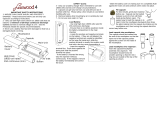
(Supersedes PQ431)
PQ431
CHTV
161-058058-001
JULY, 1983
4
and
Installation, Operation
RENEWAL PARTS IDENTIFICATION
Type CHTV Horizontal Vaporizers for Dowtherm
®
,
Therminol
®
and Other Organic Fluids
(Temperatures to 750°F at 150 psi, 15 kW thru 300 kW)
© 2010 Chromalox, Inc.
Specifications & Dimensions
System Model Number and Rating . . . . . . . . . . . . . . . . . . . . . . . . . . . . . . . . . . . . . . . . . . . . . . . . . . . . . . . . System Serial Number . . . . . . . . . . . . . . . . . . . . . . . . . . . . . . . . . . . .
Customer’s Name . . . . . . . . . . . . . . . . . . . . . . . . . . . . . . . . . . . . . . . . . . . . . . . . . . . . . . . . . . . . . . . . . . . . . Customer’s Order Number . . . . . . . . . . . . . . . . . . . . . . . . . . . . . . . . .
National Board Number . . . . . . . . . . . . . . . . . . . . . . . . . . . . . . . . . . . . . . . . . . . . . . . . . . . . . . . . . . . . . . . . Date . . . . . . . . . . . . . . . . . . . . . . . . . . . . . . . . . . . . . . . . . . . . . . . . . .
Ampere* Model Number Dimensions Weight
Oil & Weather- Explosion-
(In.) (Lbs.)
Standard Dust Tight resistant resistant Operating w/o
kW BTUH 240V 480V NEMA I NEMA XII NEMA IV Class1, Group D Volume L W H Controls
15 51,180 36.0 18.0 CHTV-316-15 CHTVO-316-15 CHTVW-316-15 CHTVX-316-15 15.7 80 36 50 600
20 68,240 48.1 24.0 CHTV-316-20 CHTVO-316-20 CHTVW-316-20 CHTVX-316-20 19.4 94 36 50 700
25 78,500 60.1 30.1 CHTV-316-25 CHTVO-316-25 CHTVW-316-25 CHTVX-316-25 23.6 110 36 50 825
30 102,360 72.2 36.1 CHTV-316-30 CHTVO-316-30 CHTVW-316-30 CHTVX-316-30 27.2 124 36 50 925
40 136,480 96.2 48.1 CHTV-316-40 CHTVO-316-40 CHTVW-316-40 CHTVX-316-40 35.6 156 36 50 1175
50 157,000 120.3 60.1 CHTV-316-50 CHTVO-316-50 CHTVW-316-50 CHTVX-316-50 43.5 186 36 50 1400
40 136,480 96.2 48.1 CHTV-624-40 CHTVO-624-40 CHTVW-624-40 CHTVX-624-40 75.0 95 48 60 1200
50 157,000 120.3 60.1 CHTV-624-50 CHTVO-624-50 CHTVW-624-50 CHTVX-624-50 106.0 111 48 60 1450
60 204,720 144.3 72.2 CHTV-624-60 CHTVO-624-60 CHTVW-624-60 CHTVX-624-60 137.0 125 48 60 1600
75 235,500 180.4 90.2 CHTV-624-75 CHTVO-624-75 CHTVW-624-75 CHTVX-624-75 168.0 149 48 60 1900
100 341,200 240.6 120.3 CHTV-624-100 CHTVO-624100 CHTVW-624-100 CHTVX-624-100 218.0 187 48 60 2350
100 341,200 240.6 120.3 CHTV-1230-100 CHTVO-1230-100 CHTVW-1230-100 CHTVX-1230-100 218.0 111 54 66 2400
125 392,500 – 150.4 CHTV-1230-125 CHTVO-1230-125 CHTVW-1230-125 CHTVX-1230-125 222.0 129 54 66 2700
150 511,800 – 180.4 CHTV-1230-150 CHTVO-1230-150 CHTVW-1230-150 CHTVX-1230-150 263.0 149 54 66 3100
175 549,500 – 210.5 CHTV-1230-175 CHTVO-1230-175 CHTVW-1230-175 CHTVX-1230-175 300.0 167 54 66 3500
200 682,400 – 240.6 CHTV-1230-200 CHTVO-1230-200 CHTVW-1230-200 CHTVX-1230-200 340.0 187 54 66 3950
225 767,700 – 271.0 CHTV-1836-225 CHTVO-1836-225 CHTVW-1836-225 CHTVX-1836-225 379.0 149 60 72 4600
250 853,000 – 301.0 CHTV-1836-250 CHTVO-1836-250 CHTVW-1836-250 CHTVX-1836-250 417.0 162 60 72 5200
275 938,300 – 331.0 CHTV-1836-275 CHTVO-1836-275 CHTVW-1836-275 CHTVX-1836-275 455.0 175 60 72 5600
300 1,023,600 – 361.0 CHTV-1836-300 CHTVO-1836-300 CHTVW-1836-300 CHTVX-1836-300 490.0 187 60 72 6000
Manufacturing
Data –
*All amperes based on 3ph 60 cycle power.
Sight Glass
Hartford Loop
Level Switch
Vent
W
L
H
Inspection Ports (2)
Spare or Fill
ASME Relief Valve
Pressure Gage
Heater Terminal Cover

CAUTION: This vaporizer is not for use with water or ethylene
glycol and water mixtures as the heat transfer media. Check with
your local Chromalox Sales and Application Engineer to be sure
that you are using an accepted heat transfer media in this vapor-
izer or consult PQ301.
Note: When installing the vaporizer, allow a minimum of 3 feet for
removing heating element if, and when, necessary.
HYDRAULIC OR MECHANICAL:
Note: The CHTVW vaporizer should be mounted so that the con-
trol box does not fall in direct sunlight.
The bed plate should be mounted on solid foundation, prefer-
ably level.
The pipe lines from the Chromalox vaporizer to the process
should be the same size as the vaporizer’s piping connections. All
piping should be arranged so that the vaporizer is not subject to
extreme nozzle loading due to thermal expansion and contraction of
pipe lines. If these instructions are not followed, cracks could devel-
op in the vaporizer where the inlet and outlet nozzles are attached.
1. The piping of the entire system should be arranged to minimize
pockets where air may be trapped. Manual air vents or bleeder
valves should be provided at all high points in the system and
every time the flow of the condensate has to drop.
2. Condensate return systems:
A. Gravity return type: The simplest and most easily operat-
ed type of vaporizer is one in which the condensate from the
heating equipment is returned to the vaporizer by gravity,
thus providing a system without moving parts. Such a sys-
tem is possible if there is sufficient difference in elevation
between the process and the vaporizer so the static liquid
head will counter-balance all frictional losses in the vapor-
izer, vapor piping process and condensate return piping
without flooding the heated equipment. See Figure 1 for a
typical schematic piping diagram.
B. Pumped return type: Where there is insufficient differ-
ence in elevation between the vaporizer and the process, the
condensate must be returned to the vaporizer by a pump.
Normally, these pumps are of the centrifugal type; howev-
er, positive displacement pump may also be used. See
Figure 2 for a typical schematic piping diagram.
3. Hartford Loop – In gravity return systems a Hartford Loop
should be incorporated where the condensate is returned to any
point below the desired liquid level of the vaporizer.
A Hartford Loop consists of a line without valves outside of
the vaporizer connecting the vapor outlet and the condensate
inlet. The condensate return line is connected to the vapor-con-
densate line or loop at the same elevation as the lowest permis-
sible level in the vaporizer. Thus, a vacuum in the heated equip-
ment can then pull liquid from the vaporizer (or a closed valve
in the vapor line can force liquid from the vaporizer) only until
the level in the vaporizer falls to the level of this connection.
Also, the resultant liquid hammering will give warning that the
liquid level in the vaporizer is too low. (See Figure 1 below.)
4. Note: All flange connections should be checked and tightened
if necessary. These sometimes loosen during transit.
ELECTRIC:
GENERAL
The Chromalox Horizontal Electric Vaporizer is a thoroughly
engineered pre-tested package, designed to give years of service,
virtually maintenance free if properly installed. The CHTV series
is ASME certified for 150 PSI at 750°F and is available in four
models, each with basic features that comply with the National
Electrical Code. Model CHTV has general-purpose NEMA I con-
struction and can be used where no hazards exist. Model CHTVO
is oil and dust tight as specified by NEMA XII standards. Model
CHTVW can be used where weather-resistant construction is
required and is constructed according to NEMA IV specifications.
Model CHTVX, Class 1, Group D, Division 1 is explosion-resis-
tant and is constructed to operate in hazardous or explosive areas.
WARNING: Vessel and pipe surfaces could achieve temperatures
higher than allowed for Class 1, Group D, Division 1 hazardous
areas. Common to all four models: OCE (open coil element) type
heating elements installed in 3”, schedule 40 seamless carbon steel
pipes; watt density on the outside of the pipe surface is 10 watts
per square inch; elements are removable without draining the fluid
in the vaporizer; requirements 208, 240, 480 and 550 volt, 3 phase,
60 cycle, 15 to 300kW.
INSTALLATION
Heater Terminal
Enclosure
Heater Terminal
Enclosure
Safety
Valve
Jacketed
Vessel
Vapor
Outlet
Hartford
Loop
Jacketed
Vessel
Liquid
Liquid Return
Liquid
Return
Pump
Condensate
Return
Tank
Vapor Outlet
Figure 1
Figure 2
Control Box Size No. Control
kW Volts H L D Circuits Accomplished By
15 240 1 Pressure
Thru or 30 x 24 x 8 1 Control with
30 480 1 Switch
40 240 1 Pressure
Thru or 30 x 30 x 8 2 Control with
60 480 2 Switches
75 240 1 Pressure
Thru or 42 x 30 x 8 3 Control with
100 480 3 Switches
1 Proportional
125 Pressure Control
Thru 480 48 x 36 x 8 4 with 4-step
150 electronic stepper
1 Proportional
175 Pressure Control
Thru 480 60 x 36 x 8 6 with 6-step
300 electronic stepper

CAUTION: Hazard of Electric Shock. The vaporizer
must be grounded using the grounding means pro-
vided in the heater terminal box and in the control
box, and employ wiring in accordance with the
National Electrical Code.
1. The vaporizer is normally supplied one of three different ways:
A. Without controls as they are going to be provided by the
customer. The customer will have to wire from his supplied
controls to the level or float switch on the vessel, and to the
heater terminal blocks and the ground lug in the heater ter-
minal enclosure.
B. With controls supplied, but mounted remotely by the user.
The customer will have to wire from remote controls to the
level or float switch on the vessel, and to the heater terminal
blocks and the ground lug in the heater terminal enclosure.
C. With all controls mounted on the same skid with the
hydraulic or mechanical part of the vaporizer. The unit is
completely wired. The only wiring necessary is to terminals
L1, L2 and L3 on the main circuit breaker and the ground-
ing lug in the control panel.
2. Note: All electrical connections should be checked and tight-
ened if necessary. These sometimes loosen in transit.
CAUTION: Hazard of Electric Shock. Disconnect all
power before servicing the vaporizer.
INSTALLATION
WIRING DIAGRAMS
OPERATION
CAUTION: To avoid possible damage to the heaters, do not ener-
gize the heaters until the vaporizer is filled with fluid.
1. The filling of the Chromalox CHTV type horizontal vaporizer
is accomplished in one of two ways:
A. On vaporizers with gravity return type condensate return
systems, the filling is done simply by pouring the heat
transfer or other organic media into the vaporizer shell
using the spare or fill nozzle and, while the filling is taking
place, bleeding the displaced air from the vent.
B. On vaporizers that use pump condensate return systems or
on systems where the condensate is not returned, the filling
would be done by first filling the condensate return tank or
supply or reservoir tank and then energizing the condensate
return or supply pump. While the vaporizer vessel is being
filled, the vent nozzle should be opening for bleeding out
the air.
2. Set the thermostat at 220°F and/or the controlling pressure
switch at its equivalent.
3. To energize the heaters, turn the “on-off” selector switch to the
“on” position. The heaters are interlocked with the level or
float switch located on the vessel, so that the heating element
will shut off automatically in case of a low liquid level.
4. Operate the vaporizer until 220°F is reached. Periodically open
the bleed valves to remove air from the system. At 220°F any
moisture that has been trapped in the system will flash into
steam and can be bled off through the bleeder valves.
WARNING: Avoid having the heat transfer fluid or the fluid to be
vaporized spilled or leaked into the pipeline or vessel insulation as
it has been found that spontaneous ignition of some of these fluids
may result at elevated temperatures.
5. After the vaporizer has been completely charged and free of
steam pockets, set the controlling pressure switch or thermostat to
the pressure or temperature point where the fluid will vaporize.
6. Operate the vaporizer until this set point is reached.
Periodically open the bleeder valves to remove air from the
system.
7. After the system is completely free of air, set the controlling
pressure switch or thermostat to the desired operating point.
Circuit
Breaker
Circuit
Breaker
L1
L2
L3
C1
C2
F1
F2
F3
F4
F5
F6
H4 H2 H3 H1 H4 H2 H3 H1
F8F7
H4
H2 H3
H1
X1 120-Volt X2
240V 480V
Transformer Primary
Pilot Light
Feed or Condensate
Return Pump (Optional)
Pilot Light
High Limit Circuit
Pilot Light
Heat #1
Pilot Light
Heat #2
Off On
Off On
Off On
3
5
7
10
4
6
8
11
9
12
M
CR
C1
C2
1CR
1CR
R
G
A
A
F9
OPC
FS2
FS-1
PSI-1
PSI-2
H4 H2 H3 H1 H4 H2 H3 H1
240V 480V
Transformer Primary
Off On
C1
C2
C3
C4
L1
L2
L3
F1
F2
F3
F4
F5
F6
F7
F8
F9
F10
F11
F12
F13
F14
H4
H3
H2
H1
F15
34
5
6
X1
X2
FS2
FS1
OPC
4-20MA
Input
135 ohm
Input
Stepper
X1
X2
A+
B-
C
D
E
1
2
3
4
1CR
1CR
Off On
Off On
Off On
Off On
7
8
9
10
11
12
13
14
15
M
R
G
A
C1
C2
C3
C4
A
A
A
Pilot LIght
Feed or Condensate
Return Pump (Optional)
Pilot Light
Low Level and
High Limit Circuit
Pilot Light
Heat #1
Pilot LIght
Heat #2
Pilot LIght
Heat #3
Pilot LIght
Heat #4
Typical Wiring Diagram
15 to 100 kW (All Voltages)
Typical Wiring Diagram
125 to 300 kW 440/480 and 550/575V

2150 N. RULON WHITE BLVD., OGDEN, UT 84404
Phone: 1-800-368-2493 www.chromalox.com
MAINTENANCE
RENEWAL PARTS IDENTIFICATION
CAUTION: Hazard of Severe Shock. Disconnect all
power to heater before servicing or replacing
heaters.
1. Heaters should be checked periodically for coatings and corro-
sion and cleaned if necessary.
2. The tank should be checked regularly for sediment around the
heater as sediment can act as an insulator and shorten heater life.
3. Remove any accumulated sludge deposits form heater and
from tank.
4. Check for loose terminal connections and tighten if necessary.
Vaporizer Heating Element Part Number
Model No.
CHTV, CHTVO, CHTVW
or CHTVX 240V 480V
316-15 063-122121-001 063-122121-002
316-20 063-122121-003 063-122121-004
316-25 063-122121-005 063-122121-006
316-30 063-122121-007 063-122121-008
316-40 063-122121-013 063-122121-014
316-50 063-122121-017 063-122121-018
624-40 063-122121-003 063-122121-004
624-50 063-122121-005 063-122121-006
624-60 063-122121-007 063-122121-008
624-75 063-122121-011 063-122121-012
624-100 063-122121-017 063-122121-018
1230-100 063-122121-005 063-122121-006
1230-125 063-122121-009 063-122121-010
1230-150 063-122121-011 063-122121-012
1230-175 063-122121-015 063-122121-016
1230-200 063-122121-017 063-122121-018
1836-225 063-122121-011 063-122121-012
1836-250 063-122121-019
1836-250 063-122121-020
1836-300 063-122121-017 063-122121-018
Limited Warranty:
Please refer to the Chromalox limited warranty applicable to this product at
http://www.chromalox.com/customer-service/policies/termsofsale.aspx.
-
 1
1
-
 2
2
-
 3
3
-
 4
4
Chromalox CHTV-316-40 User manual
- Type
- User manual
Ask a question and I''ll find the answer in the document
Finding information in a document is now easier with AI
Related papers
-
Chromalox TTSF Installation guide
-
Chromalox Gas Heater PE436 User manual
-
Chromalox MOS Operating instructions
-
Chromalox NWHMTO User manual
-
Chromalox PQ410-4 User manual
-
Chromalox MWS Installation guide
-
Chromalox OCE Installation guide
-
Chromalox PD445 User manual
-
Chromalox MTO-LT User manual
-
Chromalox MVSGI Installation guide
Other documents
-
Crane EE-8619 B User manual
-
 Hunter Fan Bacteria-Free Vaporizer User manual
Hunter Fan Bacteria-Free Vaporizer User manual
-
Crane EE-8619 User manual
-
Midmark Anesthesia Machines Installation guide
-
 Penlon Sigma Delta User Instruction Manual
Penlon Sigma Delta User Instruction Manual
-
 Duracraft DH-722 User manual
Duracraft DH-722 User manual
-
Robitussin DH750 Owner's manual
-
Kaz V200 Owner's manual
-
 Storz & Bickel GMBH Mighty Specification
Storz & Bickel GMBH Mighty Specification
-
 firewood 4 Quick start guide
firewood 4 Quick start guide








